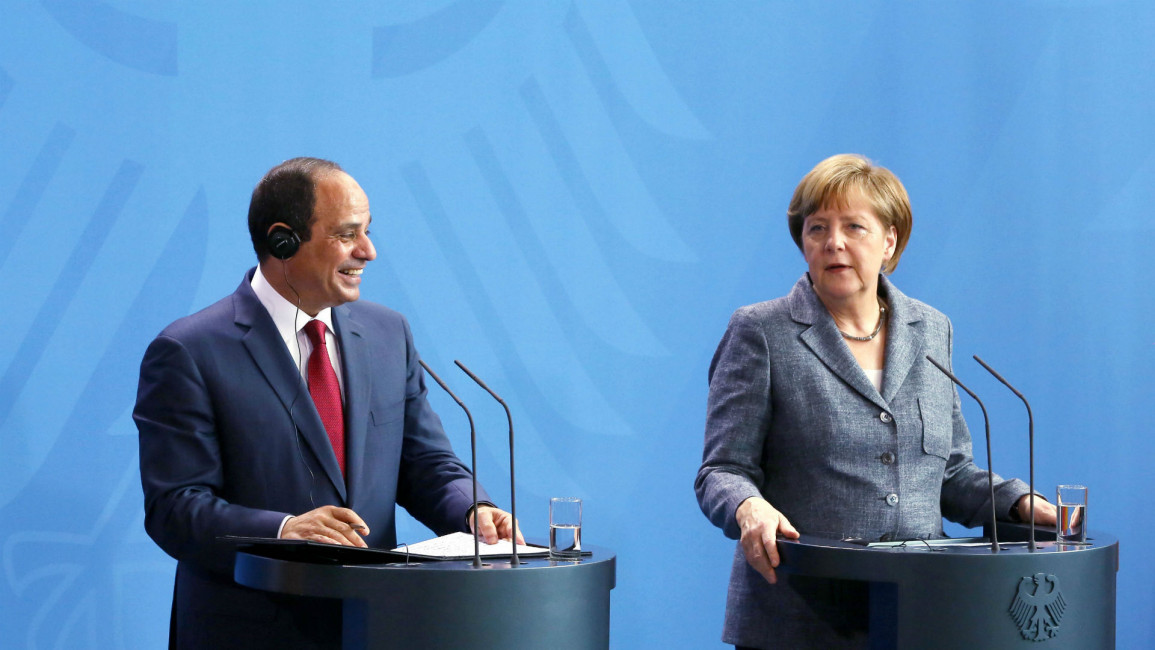
Germany rolls out the red carpet for the dictator
Realpolitik is a messy concept. Typically the idea that practical factors trump moral concerns gets pulled out of the drawer whenever a government acts unethically.
A case in point is Germany's decision to roll out the red carpet for Egyptian president Abdel Fattah al-Sisi this week as he continues to imprison, torture and kill his opponents.
The messiness of this decision - and the divisions that Sisi creates in Egypt and in Germany - came into sharp focus during his two-day visit.
While German president Joachim Gauck greeted Sisi with full military honours in Berlin, and Germany's top industrialists dined with the military leader, the parliamentary president, Nobert Lammer, cancelled his scheduled meeting with the Egyptian ruler in protest over mass death sentences passed in Egyptian courts.
The German chancellor, Angela Merkel, did not mince words about Egypt's human rights record during a joint press conference with Sisi on Wednesday. Yet, Merkel stood side-by-side with Sisi at the podium, legitimising him in front of the world's media. Her words rang hollow.
The press conference turned rowdy when a Egyptian journalist began yelling "murderer" and "fascist" at Sisi. A group of "official" Egyptian reporters tried to drown out her protest by chanting "long live Egypt, long live al-Sisi". The two leaders walked off.
Merkel had insisted that an official state visit by Sisi would be on the condition that Egypt holds parliamentary elections. For months Merkel rebuffed pressure from Cairo to extend an invitation, but finally, she gave in.
What happened?
In March, Egypt's supreme court ruled that a law governing planned elections was unconstitutional, leaving control of the country's lawmaking process in the hands of Sisi. Parliamentary elections were postponed indefinitely.
| Merkel stood side-by-side with Sisi at the podium, legitimising him in front of the world's media. Her words rang follow. |
Two weeks later and Sisi met with foreign investors in the seaside resort of Sharm el-Sheikh. German economics minister, Sigmar Gabriel, attended alongside German industry leaders and handed Sisi a formal invitation to visit Berlin the moment he signed a 'declaration of intent' with industry giant Siemens for a deal worth up to $10 billion.
By extending an official invitation in return for the deal, the Berlin threw away its strongest lever over the Egyptian leader: its power to grant him access to the global stage.
Media coverage of the visit will also legitimise the man who many say has brutalised his country even more than Hosni Mubarak.
Green light
Merkel's invitation also gave the green light to international investors, and signalled that Germany bets on the new autocrat staying in power.
More than anything else, it is a slap in the face for Egypt's liberals - first celebrated and now betrayed by Germany.
The country will pay a high price for inviting Sisi. It has forfeited credibility, authority, decency and prestige and gambled away its own interests.
Keeping up the pressure on Cairo to win political concessions is the only way to bolster stability - the alleged goal of the Germany's Middle East policy. Merkel has the power to insist on democratic reform in Egypt, yet she chose otherwise.
Under Sisi's rule, Egypt has turned into a police state with an out-of-control justice system that has sentenced hundreds of people to death within just a few minutes. Its illegal weapons exports fuel the civil war in Libya, and so long as Sisi remains in power, it cannot act as mediator in the Israeli-Palestinian conflict.
Merkel could have easily taken advantage of having the upper hand in this relationship. It is Sisi who needs German investment and recognition, not the other way round. All the chancellor had to do was sit back and insist on actions instead of promises.
After all there is a huge spectrum to explore between a complete boycott of Egypt and normalisation of relations with Cairo.
Instead, the German government opted for short-term gain: late Wednesday Joe Kaeser, CEO of Siemens AG and Sisi sealed the deals that began in Sharm el-Sheikh
for the construction of gas and steam turbines and wind-driven power stations for $9 billion.
Realpolitik of the kind the German government practiced this week amounts is little more than a sell-out.
Opinions expressed in this article remain those of the author and do not necessarily reflect those of al-Araby al-Jadeed, its editorial board or staff.




